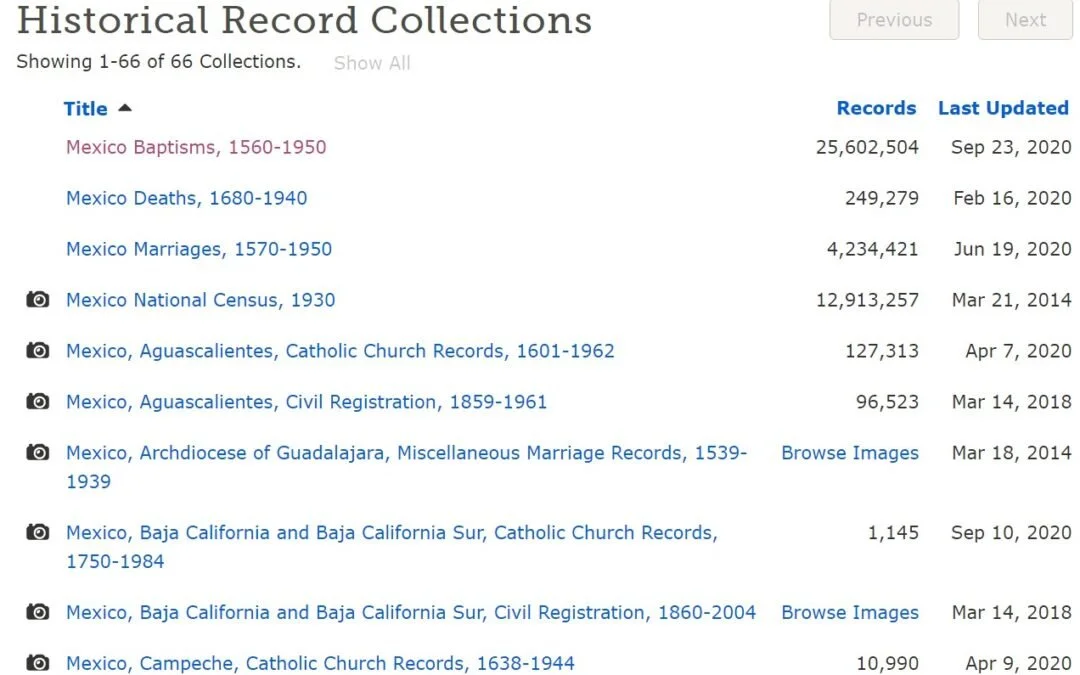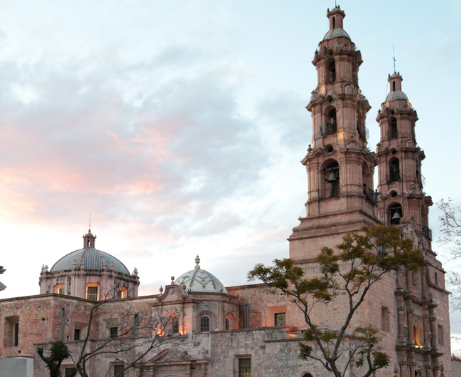
Articles

Mexican States
Southwest United States
Heritage and Governance
Tracing Your Indigenous Roots in Northeast Mexico and Texas
Learn to trace your indigenous roots in northeastern Mexico and south Texas. Historian, genealogist, and author John P. Schmal will discuss the various tribal groups inhabiting this region; research techniques for finding your ancestors in this area; and helpful websites.
Searching for Your Indigenous Roots in Mexico
If a person is trying to determine the name of the Indian tribe from which they descend, they may find out that the answer is very complex and involves many potential tribes. Each and every one of us has four grandparents and eight great- grandparents. Fourteen generations ago – around 1540 – you had 16,384 12th great- grandparents, many of whom may have been indigenous, some of whom travelled from other areas of Mexico to the towns where your ancestors lived.
Tools for Finding Ancestors in Mexico
This presentation explores what tools are out there for you to begin your research and quickly advance. In addition to tools, databases and resources, tips on how to decipher records and overcoming brick walls is explored.
This presentation was conducted by Sindy Valdez, for the Society of Hispanic Historical and Ancestral Research.
Navigating FamilySearch.org for Mexican Records
The most important FamilySearch.org link is the following one, which leads you to 66 Mexican collections, primarily Catholic Church records (going back, in some cases, to the 1500s and 1600s) and Civil Registry records (for municipio records).
Explorations in Mexican Genealogy
Each of us has two parents, four grandparents, eight great-grandparents and 16 great-great-grandparents. Fourteen generations ago – around 1540 – you had 16,384 12th great-grandparents. Within this generation you may have a wide range of ethnicities, including Spanish, French, Portuguese and Basques, as well as indigenous tribes from disparate parts of Mexico.
The Rubalcaba Surname in Aguascalientes
Origins in Santander
The surname Rubalcaba (also spelled Robalcava or Ruvalcaba) is known to have originated in the Mountains of Santander, with branches of the surname radiating from Medina de Cudeyo, Liérganes and Navajeda, three locations that are presently located in eastern Cantabria (northern Spain). Today, Cantabria is considered an autonomous area with Santander as its capital. It is bordered on the east by the Basque Autonomous Community, on the south by Castile and León (the provinces of León, Palencia and Burgos), on the west by Asturias and on the north by the Cantabrian Sea.
Cesar Chavez: Roots Deep in the Heart of Chihuahua
Cesar Chavez was an American hero, a person who was admired by both his supporters and his adversaries. In grammar school, many students learn about his advocacy and dedication to his causes, but few people know much about his roots. Nearly everyone knows that Cesar Estrada Chavez was born on March 31, 1927 near Yuma, Arizona. The Arizona State Board of Health Certificate of Birth Number 594 states that Cesario Chavez was the legitimate son of Librado Chavez (38 years old, a farmer born in Mexico) and Juana Estrada (35 years old, a housewife also born in Mexico). His birthplace was listed as “North Gila Valley” in Yuma County. A copy of that birth record has been reproduced below [Arizona Department of Health Services, “Arizona Genealogy Birth and Death Certificates: Index.” Online: http://genealogy.az.gov/].
Los Fundadores: Finding Your Spanish Ancestors in México
The following presentation offers suggestions for tracing your Mexican ancestors back to Spain or Portugal. Although we offer research suggestions and show the reader resources to locate ancestors from the Iberian Peninsula, it is important to state the following:
The Surname Orozco: From Vizcaya to Aguascalientes
The surname Orozco (or Orosco) is a surname that has been prominent throughout both Spain and Mexico over the last few centuries. According to Richard D. Woods and Grace Alvarez-Altman, “Spanish Surnames in the Southwestern United States: A Dictionary,” two elements form this surname: “oros” which means holly tree and the suffix “-ko” which suggests place. Orozco therefore means place of the holly trees. Orozco is also believed to have been derived from the Latin word “orosius” – the son of bringer of wisdom.
The Indigenous History of Jalisco, Zacatecas and Aguascalientes
Nueva Galicia’s Indigenous People: Established in 1548, the Spanish province of Nueva Galicia embraced 180,000 kilometers and included most of present-day Jalisco, Nayarit, Aguascalientes and Zacatecas.
Tracing Your Indigenous Roots in Sonora: A Challenge and an Adventure
In recent years, many Americans have taken an interest in their indigenous roots from northern Mexico. From the Late Eighteenth Century to the present, significant numbers of people from the State of Sonora migrated to Los Angeles and other areas of California.
Ritchie Valens: Pioneer Son of California
In July and August of 1781, two separate legs of an expedition arrived at the San Gabriel Mission with the intention of establishing a new Spanish settlement called “El Pueblo de Nuestra Señora de Los Angeles,” nine miles west of the mission. After a journey of 950 miles from Álamos (Sonora) through hostile Indian territory, fifty-six soldiers and eleven settlers (pobladores) and their families had arrived in San Gabriel and among their ranks were:

Article Categories
- Aguascalientes 14
- Arizona 4
- Baja California 5
- Baja California Sur 3
- California 14
- Campeche 6
- Census 34
- Chiapas 4
- Chihuahua 14
- Coahuila 9
- Colima 1
- Conquistador Chronicles 2
- Durango 3
- Ethnic Identity 36
- Genealogy 32
- Guanajuato 9
- Guerrero 9
- Hidalgo 3
- Indigenous Insights 92
- Jalisco 25
- Mexico City 11
- Michoacan 7
- Morelos 5
- Nayarit 4
- New Mexico 3
- Nuevo Leon 8
- Oaxaca 6
- Politics 10
- Puebla 6
- Queretaro 2
- Quintana Roo 5
- San Luis Potosi 11
- Sinaloa 6
- Sonora 17
- Southwest US 23
- State of Mexico 6
- Tabasco 4
- Tamaulipas 12
- Texas 6
- Tlaxcala 7
- Veracruz 8
- Yucatan 6
- Zacatecas 13













